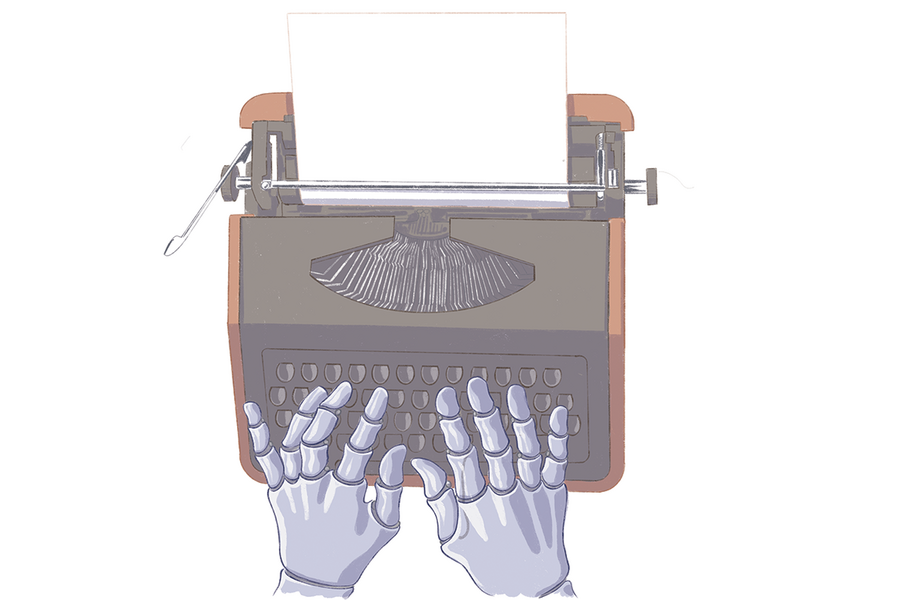REPRINTED WITH PERMISSION FROM THE CHRISTIAN SCIENCE MONITOR
 Image of robot at a typewriterJacob Turcotte/Staff
Image of robot at a typewriterJacob Turcotte/Staff
February 15, 2023
Advances in artificial intelligence have long stirred ethical debates around intellectual and creativity property rights, but the recent arrival of ChatGPT – a search engine chatbot launched in November 2022 – has turbo-boosted those existential questions across classrooms and executive suites alike.
Big Tech is spurring the momentum behind a wave of user-friendly AI tools. OpenAI, the parent company behind ChatGPT, previously made DALL-E, an AI that generates digital images from written queries.
In late January, OpenAI secured a multibillion-dollar investment from Microsoft for ChatGPT, its newest groundbreaking algorithm, which is capable of crafting convincing prose in response to various prompts.
How does ChatGPT work?
ChatGPT is currently available for free at OpenAI’s website. About 100 million people used ChatGPT in January, according to one estimate, which would be the fastest-growing user base ever.
Once registered with an email account on the website, a user can start a text conversation with ChatGPT and receive results within seconds. The machine is fast and prolific, generating answers and expanding upon ideas on screen. First prompts for ChatGPT might be simple like: “What’s the square root of 324?,” “Give me the history of the United States,” or “Write me an essay about the Bermuda Triangle.” The bigger questions come later, like “What is ChatGPT?”
“ChatGPT is a language model developed by OpenAI that uses advanced artificial intelligence to generate
human-like text,” ChatGPT responded to such a prompt. “In simple terms, ChatGPT is a program that can understand and generate text, like a human, by learning patterns in language from vast amounts of text data.”
What are the benefits of ChatGPT?
People have been using the search engine algorithm to answer questions from the creative to the efficient, such as drafting project reports, writing basic legal contracts, and summarizing historical events. ChatGPT can also help teachers by developing study guides and creating quizzes. The chatbot’s potential could automate more jobs, too, replacing customer service operators with digital assistants.
It can even write poems about scanning groceries at the self-checkout in the style of Shakespeare.
Oh wondrous machine, with thy buttons and beeps,
Thou art a marvel, of technology’s leap.
At the self-checkout, I do stand in awe,
As I scan each item, and watch as thou dost saw.
Thy sensors doth read, each barcode with care,
And the numbers doth appear, with nimble repair.
I place each item, within thy basket fair,
And watch as thou dost count, with neither flaw nor snare.
That sounds cool and spooky. What are the concerns around using ChatGPT?
Not everyone is convinced that ChatGPT is ready for public use, and many argue there needs to be more human accountability and integrity in place before allowing anyone to log in and look for answers. Already educators in high school classrooms and on university campuses are raising concerns about plagiarism and academic integrity when they have discovered students using ChatGPT to complete homework assignments and provide answers on tests.
ChatGPT’s answers are also only as good as the information the AI learns from, which can include socially unacceptable material such as conspiracy theories, Nazi propaganda, or racist hate speech. While OpenAI has implemented filters in ChatGPT that should prevent it from using such material in its answers, some users have found ways to bypass those constraints and get the AI to produce all-too-human-sounding rants and screeds.
“The answers [generated by ChatGPT] are clear and often pretty decently written, but you have no way of knowing if they’re true,” says Nir Eisikovits, director of the Applied Ethics Center at UMass Boston. “People getting information from technology that has no conception of meaning and truth is problematic.”
But ChatGPT and other artificial intelligence programs like it are being embraced by working professionals. In fact, 27% of professional workers – mostly in advertising and marketing – say they have used ChatGPT and other AI tools to help them with work-related tasks, according to a survey conducted by the social network Fishbowl. The prevalence in the workplace raises another host of concerns.
“[People] need to understand better the kind of data about the AI is trained on. They need to understand the predictive models assumptions that AI runs on,” cautions Professor Eisikovits.
It’s a limit that even ChatGPT has been programmed to be aware of. “Although ChatGPT can provide information and answers,” the AI responded when prompted, “it’s important to understand that its responses are not always accurate, and should not be taken as fact without further verification.”
Related stories
Page created on 2/22/2023 10:09:47 AM
Last edited 2/22/2023 10:16:08 AM
